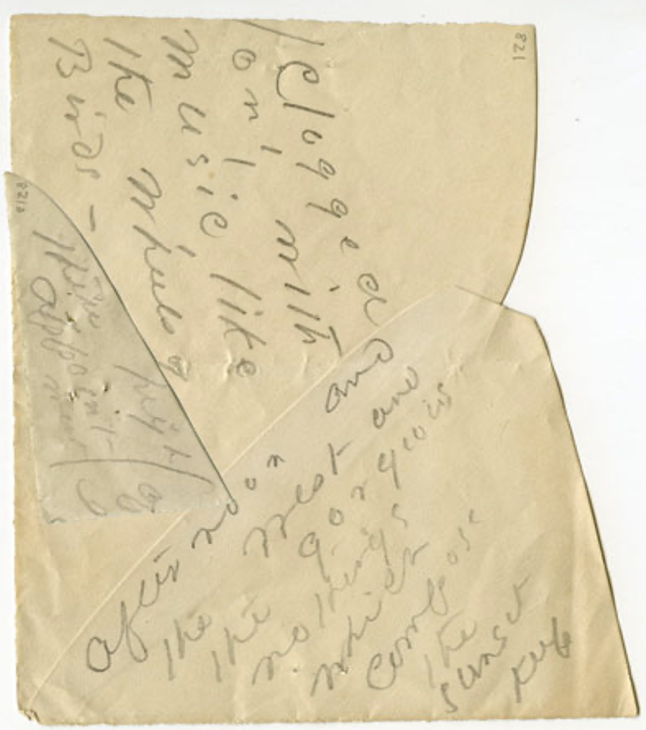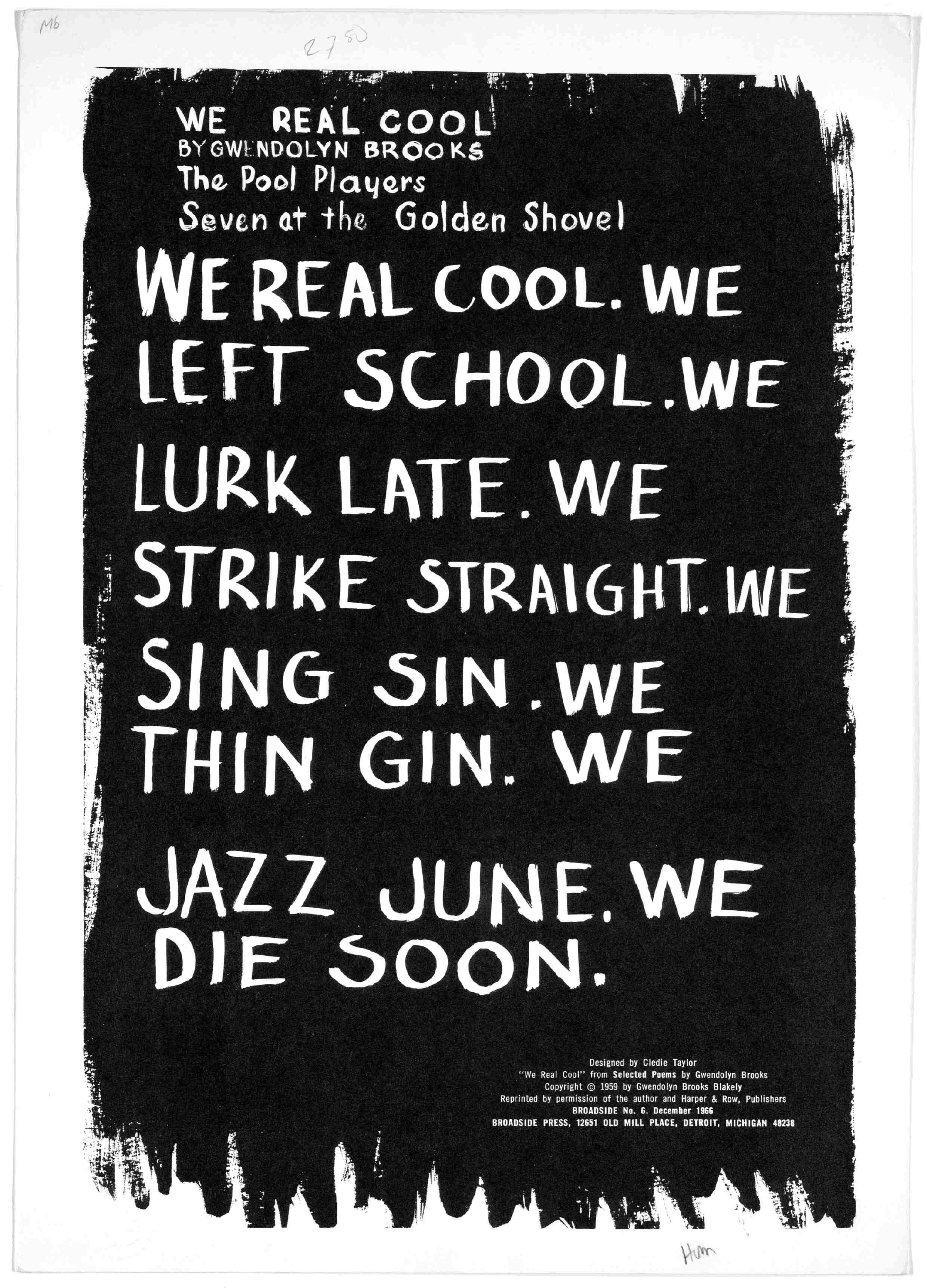Teaching
Course Designer + Instructor of Record
Junior Tutorial.
Form + Freedom:
Exploring the Poetic Experiment
Poets shape their work using a variety of formal methods: sound play or “music,” graphics and typography, as well as syntactical arrangements and rearrangements, testing the limits of language in the service of lyric expression or the unfolding of narrative. This course examines how poets write, revise, and “try things out.” Using close reading, we explore the playfulness of formal experimentation in poetry, and the ways in which poets use sonic, visual, and dictional strategies for meaning-making. We examine both canonical and contemporary poets who employ or push back against received form, asking: How do various methods of sound play create emotional resonances? What determines the poetic line, and how do different strategies of line formation affect how we move through the poem? How do various syntactical adjacencies produce disruption or create “heat”? Finally, we explore how poets use all of these tools to experiment with voice, asking: How do poets use formal strategies to speak for themselves—and speak for others? Taught in the Harvard University Department of English.
Reading + Writing Black Poetry
What is Black poetry? How can we read—and write—in ways that help us understand the formal strategies employed by Black poets in the pursuit of their deeper material? This course explores the power moves in Black poetics in the context of the Black Renaissance, the Black Arts Movement, and other moments of artistic flourishing and intellectual inquiry. Readings by Paul Laurence Dunbar, Langston Hughes, Gwendolyn Brooks, Amiri Baraka, Sonia Sanchez, Nikki Giovanni, Lucille Clifton, Rita Dove, Natasha Trethewey, Terrance Hayes, Claudia Rankine, and Danez Smith. Together the class will create a weekly provocation: a catalogue of the formal activity found in the primary reading that will then serve as a basis for their own poetic experimentation. Critical discussion and workshop will structure our days, and students will present final projects on Black poets not on the syllabus writing in any era or style. Taught at the Johns Hopkins Center for Africana Studies.
Instructor of Record
Introduction to Fiction + Poetry, Part One
An introduction to basic strategies in the writing of poetry and fiction, with readings by Joyce, Woolf, Baldwin, Munro, Garcia Marquez, Donne, Bishop, Yeats, Komunyakaa, Tretheway, and others. Students learn the elements of the short story and try their hand at a variety of forms: realist, fantastical, experimental. They also study the basic poetic forms and meters, from the ballad to the sonnet, iambic pentameter to free verse. Students compose short stories and poems and workshop them in class. Taught at the Johns Hopkins Writing Seminars.
Introduction to Fiction + Poetry, Part Two
This course delves deeper into the finer points of fiction writing, including tone, description, and point of view; students will also enrich their knowledge of poetic forms and devices, such as figurative language, verse rhythm, and the poetic line. Readings include work by Paley, Mahfouz, Calvino, Lessing, Richard Wright, Moore, Plath, Rich, Auden, Li-Young Lee, and others. Students write and workshop their own stories and poems and complete a final portfolio. Taught at the Johns Hopkins Writing Seminars.
Teaching Fellow
20th Century African American Literature
Close readings of major 20th-century writers in the context of cultural history. (I) From the Harlem Renaissance to the Federal Writers’ Project: Alain Locke, Jean Toomer, Claude McKay, Nella Larsen, George Schuyler, Langston Hughes, Zora Neale Hurston, Richard Wright. (II) From World War II to the end of the 20th century: Gwendolyn Brooks, Ralph Ellison, James Baldwin, Lorraine Hansberry, LeRoi Jones/Amiri Baraka, Toni Morrison, Ishmael Reed, Charles Johnson, Rita Dove, Suzan-Lori Parks. Led by Professor Glenda Carpio at Harvard English.
Poetry + Everything
How does life give rise to different kinds of poems, and how do those poems shape, memorialize, and alter life? What can poetry steal from neighboring discourses and media—song, prayer, visual art, news, drama, narrative, argument—and what does poetry stake out as its own? How much can history—the history of culture and politics, of technology and language—teach us about how poets revolutionize past forms and devise new forms? These three questions guide our introduction to the major categories of lyric poetry, with examples ranging from the earliest surviving poems written in English to world poetry from this very year (and even poems published during our course). Over three units—poetry and life, poetry and its neighbors, poetry and history—we will discover how classifying poems clarifies their unique meanings and pleasures, how traditions are formed, and how poets reply to poets, poems to poems. In discussions, shorter creative assignments, and three critical essays, we will learn how to describe and argue with fidelity to our poems, sensitivity to their techniques, and care for our readers. Led by Lecturer Christopher Spaide at Harvard English.
Lyric + Narrative
This course is a general introduction to reading, discussing and writing about poetry, both lyric and narrative. Our focus will be on the Romantics, experimentalists writing amidst a time of political upheaval and radical social change: William Blake, William Wordsworth & Samuel Taylor Coleridge, Anna Barbauld, Charlotte Smith, Lord Byron, Percy Shelley, John Keats and John Clare. We will also read poets who influenced them (Shakespeare, Milton), poets they influenced (Emily Dickinson, TS Eliot) and a few poets writing right now (Monica Youn, Terrance Hayes). At the beginning of the term each student will also pick a poet we’re not reading in class to work on throughout the course. Led by Professor Andrew Warren at Harvard English.
Kinds of Poetry + Reasons to Read It
This course will help you read, enjoy, describe, and examine poetry in English, from the medieval period to the 21st century. We look at poems one by one, taking them apart to figure out how they are put together and why they work as they do; we will also see how poems speak to one another, and how previous readers have thought about the history of poetry. We concentrate on kinds of poems and on reasons to read them; people (not all people, but some people) read poems for fun, for consolation, for inspiration, for technical challenge, even (or especially) when those poems are not part of any academic curriculum. We are going to see how and why. Led by Professor Stephanie Burt at Harvard English.
On the Run: The Fugitive + the Refugee in American Literature
Escaped slaves, refugees, outlaws, and rebels are all on the run in the pages of American literature. In a nation founded in the name of “life, liberty and the pursuit of happiness,” stories of the fugitive making a break for freedom have been both troubling and enchanting. In this course, we will examine narratives of flight by American writers from the early days of the Republic through the present. These authors explore many different kinds of fugitivity: from the story of Henry “Box” Brown, a slave who hid in a crate and mailed himself to freedom in the North, to recent fiction by Edwidge Danticat and Viet Thanh Nguyen. Along the way, we’ll consider narratives of outlaws, war refugees, undocumented immigrants, and insurrectionaries. Engaging with a diverse range of authors, our texts will include autobiography, novels, poetry, and folklore. Led by Lecturer Thomas Dichter at Harvard English.
Literary Forms
This foundational course examines literary form and genre. We explore some of the many kinds of literature as they have changed over time, along with the shapes and forms that writers create, critics describe, and readers learn to recognize. The body of the course looks to the great literary types, or modes, such as epic, tragedy, and lyric, as well as to the workings of literary style in moments of historical change, producing the transformation, recycling, and sometimes the mocking of past forms. While each version of English 20 includes a different array of genres and texts from multiple periods, those texts will always include five major works from across literary history: Beowulf (epic), King Lear (tragedy), Persuasion (comic novel), The Souls of Black Folk (essays; expository prose), and Elizabeth Bishop’s poems (lyric). The course integrates creative writing with critical attention: assignments will take creative as well as expository and analytical forms. Led by Professor Stephanie Burt at Harvard English.









